

Meet Jens: Your German language tour guide
Introductions, personal pronouns, formal vs informal address, and the important verb "to be".

Hold onto your Bratwürste, you're about to learn...
- How to introduce yourself
- The most important "little" words — I, you, he, she, they, it
- How to talk about people using the verb "to be"
Meet Jens. He will be your German tour guide during this brief exploration of the German language. He’ll help you navigate the basics of German grammar and vocabulary.
Jens just introduced himself. Don't be rude! Introduce yourself back!
That wasn't so hard, was it? You're learning German already!
Poor Jens... He can't catch a break
Jens didn't pay much attention to his language classes in school, so he likes to stick to vacation spots where he can speak his native language, German. That leaves him with three main choices:

Jens loves The Sound Of Music , so he decides to explore Austria. But when he goes to buy his train ticket, his credit card is declined...
... I guess he's staying in Germany for a while.
That's great news for us because it means he can help us learn a little German ( Deutsch ). But that's bad news for Jens. Now he's stuck on his grandma's couch for the summer, and he doesn't exactly have the nicest things to say about his family...
Meet Jens's family

Jens is bringing you home to meet his family! In order to follow the family gossip, you'll need to know the little words for I, you, he, she, it, and they .
You'll also need to know this basic verb: to be . In German, notice the verb morphs slightly depending on who it's describing. (We'll get into that more later, but for now, take a look at this one verb.)
Verb: sein (to be)
So how does Jens describe his family members when they aren't listening?
Jens describes his family
Jens, tell us about your brother.
What about your sister?
How about your parents?
What about your house? How would you describe it?
Jens, do you have anything positive to say? How would you describe yourself?
Take a second to figure out how you might describe some of your own family members using the new verb, to be . (Don't worry, we won't tell them what you say.)
- Tell me about your brother _______________
- Tell me about your sister _______________
- Tell me about your parents _______________
- Tell me about yourself _______________
Formal vs informal in German (how not to offend Jens's grandma!)
What’s all this formal and informal nonsense? Before Jens can bring you back to meet his grandma, we have to clear something up.
In English, we usually show respect to someone by changing the way to refer to them. We usually call someone “ma’am” or “sir” to show respect, but we still refer to them as you . Take these examples:
- “Excuse me, ma’am. Do you speak German?”
- “Excuse me, sir. Do you speak German?”
- “Hey kid, do you speak German?”
But in German, they have a completely different word for you depending on whether you are speaking informally (to a friend) or formally (to a superior or a stranger).
So if you want to ask a person if they speak German, you’d have to decide whether or not to use the formal or informal.
So how would you ask Jens’s grandma if she speaks German without offending her? Which “you” pronoun would you use?

That's right. You'd use Sie.
Play Sprechen Sie Deutsch?
(Don't forget it! You do not want to offend Oma!)
Free German Lessons
German children's stories, german course reviews.
Start Learning German in the next 30 Seconds with a Free Lifetime Account

- Certificate
- German Alt Codes
- What Parents Say
- Introduction 1
- Introduction 2
- Colours 2 with Flags
- Numbers 1 and Time
- Numbers 2 and Maths
- Breakfast 1
- Breakfast 2
- Weekdays 1 with Months
- Weekdays 2 with Activities
- Family 1 with Activities
- Family 2 with Birthdays
- Book 1 Letters and Sounds
- Continents 1
- Continents 2
- House 1 and Rooms
- House 2 and Furniture
- To be (sein) 1
- To be (sein) 2
- To have (haben) 1
- To have (haben) 2
- Town/Directions 1
- Town/Directions 2
- Likes and Dislikes 1
- Likes and Dislikes 2 (with Food)
- Letter to Penpal 1
- Letter to Penpal 2
- Letter to Penpal 3
- Classroom 1 with Prepositions
- Classroom 2 with Prepositions
- Classroom 3 with Prepositions
- People 1 - Sebastian Vettel
- People 2 - Merkel and Klum
- German Dictionary 1
- German Dictionary 2
- German Dictionary 3
- Modal Verbs 1
- Modal Verbs 2
- Modal Verbs 3
- Zeit für Deutsch A
- Zeit für Deutsch B & Numbers
- Zeit für Deutsch C & Animals
- Zeit für Deutsch D & Fruit
- Zeit für Deutsch E & Weather
- Zeit für Deutsch F & Breakfast
- Zeit für Deutsch G & Months
- Zeit für Deutsch H & Birthdays
- Zeit für Deutsch I & Phone
- Zeit für Deutsch J & Weekdays
- Zeit für Deutsch K & Family
- Zeit für Deutsch L & Book (letters and sounds)
- Zeit für Deutsch M & School
- Zeit für Deutsch N & Continents and Countries
- Zeit für Deutsch O & House and Rooms
- Zeit für Deutsch P & To be
- Zeit für Deutsch R & To have
- Zeit für Deutsch S & Sport
- Zeit für Deutsch T & Hobbies
- Zeit für Deutsch U & Town and Directions
- Zeit für Deutsch V & Likes and Dislikes
- German Staff Meeting
- Elves and the Shoemaker
- Euro Day of Languages Assembly
- German Signage
- German Border (Word)
- Stille Nacht - Silent Night Lesson
- Football - Fußball
- Dodgeball - Völkerball
- Scheme of Work
- Lesson and Extras List

Welcome to a free, exciting and innovative method of delivering German lessons to school children. Zeit für Deutsch is a fast paced, upbeat German session performed by all members of the class in the target language. All topics are introduced by a song or chant and then activities relating to the topic follow. Zeit für Deutsch allows the children to consolidate key vocabulary in German and apply this vocabulary into German sentence structures in a functional way. It also inspires a love of German and foreign languages, encouraging the children to think in a foreign language and communicate in it without relying on their mother tongue.
Please consider buying a figurine from my store so that I can continue to keep this website up for free. Having 2 daughters myself, I am into dad items and with father's day coming up in June, I'm sure they would make a great gift. Either click here or on the store in the menu to see what's available. Please compare the price of these items to similar ones on Amazon, realise what a great deal they are, and then place your order.
Zeit für Deutsch has primarily been designed for teachers who are teaching beginners German to their students. Although all of these resources are built around my experience of teaching German at primary (elementary/middle) school, many of my resources and strategies can be applied to teaching older students. As well as Lesson Plans, Powerpoints, Handouts and Flashcards, the website contains a wealth of resources which I have built up during my time teaching German. Please see my 'Extras' page for these.

Secondary (High)
School Teachers
If your pupils are starting their German journey from scratch, then this website will prove very useful to you, especially the lesson plans. Remember, you can download all of the materials and adapt them as you need to. Because of the fun, excitable and fast-paced nature of the Zeit für Deutsch sessions (which begin after lesson 8), my original intention was to run them with just years 3 and 4. However I have found that older children love the sessions just as much and I now run the sessions throughout Key Stage 2. You could always just lift ideas from Zeit für Deutsch and use the activities as a starter (or plenary) to get the children going and thinking in the language. Whatever your approach with using the resources on this website, please let me know.

Head Teachers
Before deciding to choose Spanish or French for your primary school, please explore the resources on this website first. Choosing German opens up many opportunities. More so than from other countries, trainees teachers from Germany will want to work and train in your school, bringing a vital inter-cultural element. German schools will want to arrange projects with you and there are many opportunities to make partnerships with German businesses. In my opinion, German is the most important language to learn. Please read this article by the Telegraph and watch the two videos at the bottom of this homepage to learn why. You could also click here to a very informative website giving 15 reasons why you should learn German, as well as lots of other information. Furthermore, please visit 'Learn German with Herr Antrim's' YouTube Channel, with lots of informative videos including addressing the reasons people give for not learning German ( click here ), and giving further reasons for learning the language ( click here ).

Parents and Home Schooling
German is ideal for homeschooling as spelling and pronunciation are regular and there are thousands of cognates between English and German. The lessons are great for non-German speakers as each plan explains what to do on every powerpoint slide. By working alongside your child and using the resources, you will find that you will start speaking a good level of German yourself.

Please use this website so that you can re-visit your lessons and also get a head start by looking at your next and future lessons.
Images to Pin on Pinterest:

- Scroll to top
Engaging German Topics: Discussions and Debates for Language Learners
Looking for an opportunity to practice your German language skills and engage in thought-provoking conversations? Our German Discussion Topics offers a diverse range of subjects tailored for learners at various proficiency levels. By participating in discussions on these topics, you will not only improve your language abilities but also gain valuable insights into German culture.
We have carefully curated topics from various categories , including politics, history, arts, and culture. Whether you're a beginner seeking to practice basic conversation or an advanced learner eager to engage in complex debates, you'll find subjects that suit your needs. These discussions will help you enhance your speaking, listening, reading, and writing skills while expanding your vocabulary and honing your grammar.
Beginners can explore topics such as German cuisine, famous landmarks, and popular traditions to learn new words and phrases while sharing their thoughts. Intermediate learners will appreciate themes like environmental issues, work-life balance, and technology's impact on society, which will enable them to express their ideas more fluently and confidently.
Let us take care of your German Learning. For FREE.
The biggest platform & community for your german language: • Interactive and engaging lessons • A powerful Placement Test • Access to hundreds of free resources • Immersive language and cultural experiences • Organized events: Book clubs, debates, etc • Track your progress with detailed analytics • Join a supportive community of learners Welcome to your safe space for mastering German!
Create new account
Email Address
You need to agree with terms and conditions
*By pressing Sign up, I agree with the Terms and conditions & Privacy Policy
Already have an account? Log In
Forgot my password
No worries. We'll send you the instructions on your e-mail.
Forgot password?
Don't have an account? Sign Up
Your e-mail:
Social auths, placement test.
Categories:
Change password:
❮ Back Reset Password
❮ back enter reset code.
Environmental conservation
International relations
Philosophy and ethics
Cultural diversity
Creativity and innovation
Event planning and hosting
Professional goal setting
Current events
Technology and advancements
Personal organization
Personal beliefs
Personal leadership
Personal branding
Parenting and child development
Natural disasters
Volunteerism
Stress management
Public speaking
Curiosities
Science and space
History and culture
Personal development
Meditation and spirituality
Yoga and fitness
Personal motivation
Socializing & making friends
Entertainment and media
Personal budget and expenses
Physical activity and sports
Health and self-care
Board games and card games
Food and drink culture
Social media & internet trends
Childhood education
Cooking and Meal planning
Garden and farming
Personal goals
Language learning
Home and interior design
Relationship and dating
Communication
Personal hygiene
Fashion and clothing
Human relationships
Public transportation
Study and education
The news and current events
Animals and pets
Cars and transportation
Photography and art
Cookery and Recipes
Careers and professions
Outdoor activities
Books and literature
Grandparents
Time/weather
Healthy Life
Food
Going to to the shop
Click on the topic that suits your level and interest. Each topic has its own questions that you can discuss on!
Topics to discuss in German
C1 - Difficult topics
B1-B2 - Medium topics
A1-A2 - Easy topics
Lessons (Vocabulary & Grammar)
Listening exercices
Reading exercices
Speaking exercices
Extra exercices for grammar
Donation page
Events on L2D
Planned features
Report a bug & Suggest a feature
Contact for marketing & partnerships
Go to L2D Blog
Follow us & be updated!
Get where you need fast
Take the placement test!
Visit the Blog
© 2023 Copyright Learn 2 Deutsch . All rights reserved. Privacy Policy(GDPR) . Terms and conditions
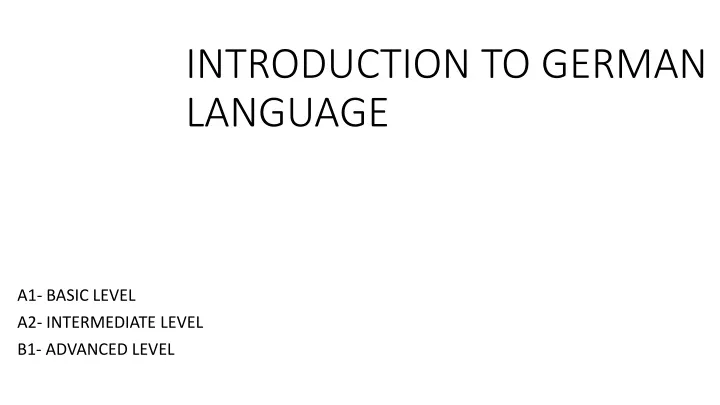
INTRODUCTION TO GERMAN LANGUAGE
Nov 16, 2021
80 likes | 106 Views
Introduction to German Language- A1 Basic level, A2 Intermediate level, B1 Advanced level. Learn how to greet someone, How to introduce yourself and vocabulary.<br>http://germanmitanjali.com/
Share Presentation

Presentation Transcript
INTRODUCTION TO GERMAN LANGUAGE A1- BASIC LEVEL A2- INTERMEDIATE LEVEL B1- ADVANCED LEVEL
A1 LEVEL ALPAHBETS • A-ah I-ih Q-kuh Y-uepsilonn • B-beh J-jott R-err Z-tset • C-tseh K-kah S-ess • D-deh L-ell T-teh • E-eh M-emm U-uh • F-eff N-en V-fau • G-geh 0-oh W-weh • H-hah P-peh X-iks
GREETINGS • Guten Morgen (Good morning) • Guten Abend (Good evening) • Guten Tag (Good day) • Guten Nacht (Good night)
WEEKDAYS • Montag (Monday) • Dienstag (Tuesday) • Mittwoch (Wednesday) • Donnerstag (Thursday) • Freitag (Friday) • Samstag (Saturday) • Sonntag (Sunday)
SEASONS NAME • Sommer (Summer) • Winter (Winter) • Monsun (Monsoon) • Frühling (Spring) • Herbst (Autumn)
MONTHS NAME • Januar (January) • February (February) • März (March) • April (April) • Mai (May) • Juni (June) • Juli (July) • August (August) • September (September) • Oktober (October) • November (November) • Dezember (December)
W- QUESTIONS • Wer? (Who) • Wen? (Whom) • Wem? (To whom/ for whom) • (Verb on position 2 and subject on 3)
- More by User

Quick German - German Language Learning Lessons
QuickGerman is a new method developed especially for English speaking ones which helps you to learn more than 1200 words within only 38 lessons. Learn to speak German language with QuickGerman.com online German Speaking and Learning Course! Visit us at : http://www.quickgerman.com/
649 views • 5 slides
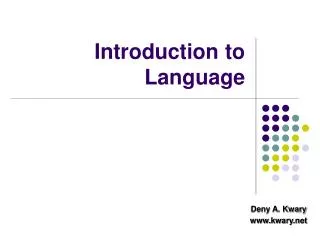
Introduction to Language
Introduction to Language. Deny A. Kwary www.kwary.net. The Textbook. Introduction to Language By. Fromkin, Rodman, and Hyams. The Course Materials. Open: www.kwary.net Click: Linguistics Click: Introduction to Language Download the lecture materials. What is Language?.
1.79k views • 9 slides

Introduction to Language Language Comprehension
940 views • 42 slides

Introduction to Language. By: Waleska J. Rodríguez Bonilla Course: Language and Culture ENG 604 Profa . Evelyn Lugo University of EL Este. “Language is more than just a means of communication”. It influences our culture and even out thought processes. From: Language and Thought Processes.
675 views • 16 slides
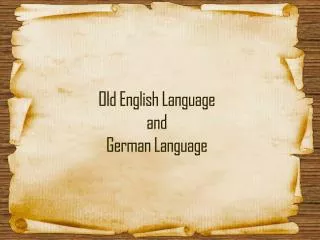
Old English Language and German Language
Old English Language and German Language. German Language and old English similarities. Old English Alphabet. German Alphabet. Old English Charateristics. The old English alphabet consists of 24 letters.
706 views • 10 slides

Phonetics. Introduction to Language. Objectives:. Explore the relationship between sound and spelling Become familiar with International Phonetic Alphabet (IPA ) Understand the nature of consonants and vowels Learn where particular sounds occur (physical aspects of the human vocal tract)
564 views • 28 slides

Introduction To Language
Introduction To Language. Maureen Cowan Chapter Six. In this WikiSpace Page:. You will discover the answers to the following questions: What are languages, and what role do languages play in cultures? Why are languages distributed the way they are? How do languages diffuse?
478 views • 21 slides

A Brief Introduction to German
A Brief Introduction to German. Session 4 Viertende Übung. (Konrad Adenauer) Wilkommen. Aber zuerst. . . .Überprürung Der Lehrer is a_____________________. Die Lehrerin is a ___________________. “Literatur” bedeutet________________. “Franzörsisch” bedeutet _____________.
250 views • 17 slides

German Language and Literature
German Language and Literature. Johanneke Sytsema Subject consultant for Linguistics and Dutch Studies [email protected]. Overview session. German language and literature Bibliographic sources Current awareness E-journals Full text sources online Author Reference works
474 views • 20 slides

The German Language
The German Language. By: Braden Evers. Numbers.
383 views • 18 slides

German Language
Standard German has around 90 million native speakers, and other varieties of German have some 30 million. There are about 80 million people who speak German as a second language, and many others study it as a foreign language.
247 views • 8 slides

German language Home Tutor
Actually, it is about triumphing in vocation by being at the Best German language tuitions in Delhi NCR. You can arrange the same as the coaching institute in Delhi. The purpose behind the notoriety is the strategy for educating at the place. The instructors here sick at the best comprehend your potential and this will help them control you as needs be founded on the kind of ability and bent you hold.
88 views • 5 slides

German Language Course | German Language Learning App Online
Edubull is providing German Language Course Online. Looking for German Lessons with German Language Basics, introduction to the German Language Classes with the German Language Learning App.
50 views • 4 slides

Bitcoin presentation (German language)
The slide deck I've used to present Bitcoin to people who are new to the topic.
1.23k views • 65 slides

German language course| Language Pantheon| German language institute
If you are keen to learn German language then without any doubt come and join German language courses with language pantheon and achieve success in learning German fluently
96 views • 7 slides
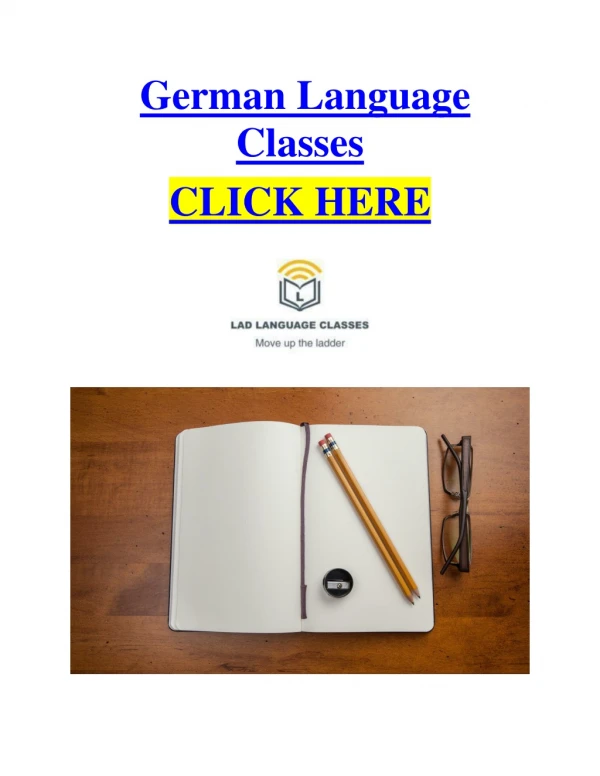
German Language Classes
German Language Classes in bellandur
40 views • 3 slides

Learn German Language In SquadVision To Achieve German Speaking Goals
Watch our new presentation, Squadvision is the best German Language institute in varanasi. We have made a specialized institute for German aspirants to study German for fulfilling all kinds of their requirements like for hobby or pursuing a career or studying abroad in Germany.
57 views • 5 slides
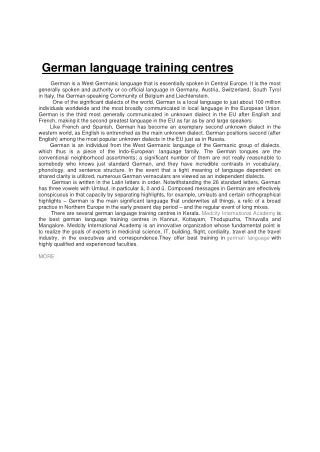
German language training kottayam
German is a delegate of the Germanic gathering of the Indo-European language family. The German language created in a few phases. Old High German, the Early Medieval rendition of the language, had transformed into Middle High German by the High Middle Ages.
15 views • 1 slides
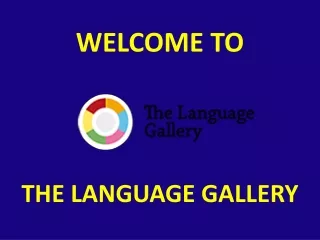
German Language Course
The Language Gallery is the best language school in UK which offers language classes to learn language in the UK and Canada. Discover our languages classes by our experienced teachers who provide the students a deep understanding of language.German Language Course
75 views • 6 slides
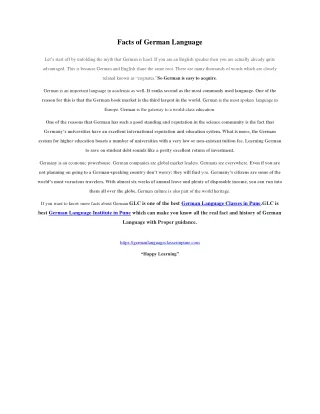
Facts of German Language
22 views • 1 slides

German Language Course | German Language Institute | Langma German Language Course | German Language Institute | Langma
German language course at Langma is best suited for beginners to advanced learners. We are the pioneer German language institute offering online German courses. visit us: https://langmainternational.com/28/german-language-course
84 views • 6 slides
German Word Of The Day

How to introduce yourself in German (easy PDF script)
When you start learning German, one of the very first things you will probably learn is how to introduce yourself in German. There are several reasons why this topic is important. First, every time you meet new people in a German-speaking country, you are going to introduce yourself in German. You will repeat the same phrases in German so many times, that it makes sense to learn them by heart at the very beginning of your language-learning journey. Second, the self-introduction phrases are relatively easy to learn even if you are a total beginner. Being able to talk about yourself in a new language so quickly gives you an immediate boost in confidence and motivates you to learn more. So don’t hesitate and learn how to introduce yourself in German.
Some of the links on this site are affiliate links. I may earn an affiliate commission for some purchases you make through those links at no extra cost for you.
My tip for you: Download and print “How to introduce yourself in German PDF” , fill it with the information about yourself and learn it by heart as a script.
If you don’t know how to say some words like your country, profession, or hobby in German, use any available online dictionary to translate.
Practice your introduction with someone who speaks German and tell them to ask you questions as well. If you don’t know anyone who speaks German, try looking for a language exchange partner or tutor online, for example, on Italki . I taught German on Italki for almost 2 years and used it as a student to learn Hindi and English. You can find not only professional German teachers but also community tutors on Italki . Community tutors are native speakers without formal teacher education. Community speakers usually charge less than professional teachers and they are perfect for practicing informal conversation.

How to introduce yourself in German PDF
1. how to say “my name is ….” in german..
Ich heiße _______ . – My name is (name) ( li terally means ‘I am called….’) .
Ich bin _______ . – I am (name).
Mein Name ist _______ . – My name is (name, surname) .
Ich heiße Maria. – My name is Maria.
Ich bin David. – I am David.
Mein Name ist Lucy Stein. – My name is Lucy Stein.
First two options are less formal. “Mein Name ist …” is more often used when you say your full name.
2. Country and nationality in German.
Ich komme aus _______ . – I am from (country).
Ich komme aus Deutschland. – I am from Germany.
Ich komme aus Indien. – I am from India.
Ich komme aus den USA. – I am from the USA.
Ich komme aus der Ukraine. – I am from Ukraine.
Most of countries in German language are used without articles, but there are some exceptions like die USA, die Ukraine, die Türkei etc. The preposition aus = from always takes the dative case, so if the country has an article, you have to change the article to dative case. I know it can be confusing for the beginners, so you can also just use Google your country name. Easy German has a great video about countries with articles .
If you want to mention your nationality, you can also say:
Ich bin _______ . – I am (nationality).
Ich bin Mexikaner/Mexikanerin. – I am Mexican.
Ich bin Amerikaner/Amerikanerin. – I am American.
For most nationalities, the ending -in is added for the female form.
3. Place of residence
Ich wohne in _______ . – I live in (city/country).
Ich wohne in Berlin. – I live in Berlin.
Ich wohne in Australien. – I live in Australia.
Ich wohne in der Schweiz. – I live in Switzerland.
Here the preposition in also takes Dative case, so you have to conjugate the article in dative if the country is used with the article.
4. Age, birthday
Ich bin _______ Jahre alt. – I am (age) years old.
Ich bin _______. – I am (age).
Mein Geburtstag ist im _______ . – My birthday is in (month).
Ich bin 26 (sechsundzwanzig) Jahre alt. – I’m 26 years old.
Ich bin 55 (fünfundfünfzig). – I am 55.
Mein Geburtstag ist im August. – My birthday is in August.
Months in German are very similar to English, read more here .
5. Occupation, job
Ich bin _______ von Beruf. – literally means I’m ____ by profession.
Ich bin _______ . – I’m (profession).
Ich bin Student/Studentin. – I am a student.
Ich bin Rentner/Rentnerin. – I am retired.
Ich bin Lehrer/Lehrerin von Beruf. – I’m a teacher.
Ich bin Programmierer/Programmiererin. – I’m a programmer.
Ich bin Arzt/Ärztin. – I’m a doctor.
Same as with nationalities, the words for professions in German are different for women and men. The ending -in indicates that the person is female.
6. Languages
Meine Muttersprache ist _______. – My mother tongue is (language).
Ich spreche _______. – I speak (language).
Ich lerne _______. – I am learning (language).
Meine Muttersprache ist Spanisch. – My mother tongue is Spanish.
Ich spreche Englisch, Französisch und Arabisch. – I speak English, French and Arabic.
Ich lerne Chinesisch und Deutsch. – I am learning Chinese and German.
7. Talking about family in German
Ich bin _______. – I’m (marital status).
Ich bin ledig/verheiratet. – I’m single/married.
Ich habe _______. – I have (children/siblings)
Ich habe ein Kind/zwei Kinder. – I have a child/two children.
Ich habe keine Kinder. – I don’t have children.
Ich habe 3(drei) Geschwister. – I have 3 siblings.
Ich habe keine Geschwister. – I don’t have siblings.
Ich habe einen Bruder/zwei Brüder. – I have a brother/two brothers.
Ich habe eine Schwester/zwei Schwestern. – I have a sister/two sisters.
Ich bin ledig und habe keine Kinder. – I’m single and dont have children.
Ich bin verheiratet und habe 3 Kinder. – I’m married and have 3 children.
Ich habe einen Bruder und zwei Schwester. – I have a brother and 2 sisters.
Ich habe 3 Schwestern. – I have 3 sisters.
More family vocabulary and phrases to talk about family in German
8. Hobbies in German
Mein Hobby ist _______. – My hobby is (hobby).
Meine Hobbys sind _______. – My hobbies are (hobbies).
Mein Hobby ist Musik. – My hobby is music.
Meine Hobbys sind singen und tanzen. – My hobbies are singing and dancing.
Mein Hobby ist Einkaufen. – My hobby is shopping.
9. How to say “I like…/I don’t like…” in German.
To say “I like doing something”
Ich _______ gerne. – I like (doing some activity).
Ich _______ nicht gerne. – I don’t like (doing some activity).
Ich reise gerne. – I like travelling.
Ich koche nicht gerne. – I don’t like cooking.
Ich lese gerne Bücher. – I like reading books.
Ich esse gerne Gemüse. – I like to eat vegetables.
To say “I like something”
Ich mag _______. – I like (something).
Ich mag _______ nicht. – I don’t like (something).
Ich mag Sushi. – I like sushi.
Ich mag Pizza nicht. – I don’t like pizza.
Ich mag Kaffee, aber ich mag Tee nicht. – I like coffee but I don’t like tea.
To talk about your favorite things
Mein Lieblings… ist _______. – My favourite (food/movie/sport) is (name).
Mein Lieblingsessen ist Pizza. – My favorite food is Pizza.
Mein Lieblingssport ist Fußball. – My favorite sport is football.
You can add Lieblings- (favorite) to any word to talk about your favorite things: Lieblingsschauspieler(favorite actor), Lieblingsbuch(favorite book), Lieblingsfilm(favorite movie), Lieblingsgetränk(favorite drink).
Now introduce yourself in German in the comments below!

germanwordoftheday
2 responses to “How to introduce yourself in German (easy PDF script)”
Ich mag diesen Blog. Vielen Dank an den Entwickler
It’s very nice and it is easy to understand but can add some poin like after introduction how to end of introduction phase
Leave a Reply Cancel reply
Your email address will not be published. Required fields are marked *
Save my name, email, and website in this browser for the next time I comment.
Greetings and Introduction in German
How do you say hello and introduce yourself in German? The basics of the German language. Greetings, saying goodbye and basic phrases to start speaking German
- 1 Saying hello
- 2 Saying our name
- 3 Asking what another person’s name is
- 4 Saying what our profession is
- 5 Asking what another person’s profession is
- 6 Saying Your Age
- 7 Asking how old someone is
- 8 Saying where you are from
- 9 Where we are from and where we live
- 10 Asking about someone’s nationality
- 11 Language knowledge
- 12 Asking about someone’s German
- 13 Being Polite
- 14 What to say at special occasions
- 15 Saying Goodbye
- 17 Audiovisual supplement
Welcome to the first article for learning German from GermanVeryEasy.com . We hope that the material we have prepared is helpful to you.
Here we go!
Saying hello

Hello in German is as easy as saying:
Hallo! Hello!
The following is a list of the most common greetings in German:
Saying our name
We usually have to say our name when we introduce ourselves:
Mein Name ist Karl My name is Karl
Ich heiße Karl My name is Karl
or more simple with the verb sein (to be):
Ich bin Karl I’m Karl
Asking what another person’s name is
Wie heißen Sie? What’s your name?
To remain polite when we mention the name of another person, we do so with their last name preceded by Herr (Mr.) or by Frau (Mrs.).
the informal way:
Wie heißt Du? What’s your name?
With the informal way we can refer to another person with their first name.
Saying what our profession is
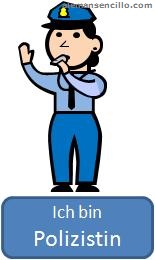
One of the phrases that you will be asked most is what you do. A simple way to answer is:
Ich bin Lehrer I’m a teacher
Ich arbeite als Lehrer I work as a teacher
Asking what another person’s profession is
The formal way:
Was sind Sie von Beruf? What’s your profession?
Was machen Sie beruflich? What do you do for a living?
The informal way:
Was bist Du von Beruf? What’s your profession?
Was machst Du beruflich? What do you do for a living?
Saying Your Age
To say how old you are is simple:
Ich bin 30 Jahre alt I’m 30 years old
Click on this link if you would like to review numbers in German .

Asking how old someone is
Wie alt sind Sie? How old are you?
Wie alt bist Du? How old are you?
Saying where you are from

The masculine form:
Ich bin Argentinier I’m Argentinian
The feminine form:
Ich bin Argentinierin I’m Argentinian
Where we are from and where we live
Learning these phrases is not a bad idea; you’ll have to use them hundreds of times:
Ich komme aus Madrid I’m from Madrid
Ich wohne in Stuttgart I live in Stuttgart
Asking about someone’s nationality
Welche Staatsangehörigkeit haben Sie? What’s your nationality?
Language knowledge
We will frequently have to talk about which languages we know:
Ich spreche Spanisch, Englisch und Deutsch I speak Spanish, English and German
Ich spreche kein Deutsch [formal or informal] I don’t speak German
Ich kann kein Deutsch I don’t speak any German
Ich spreche ein bisschen Deutsch I speak a little German
Asking about someone’s German
Sprechen Sie Deutsch? Do you speak German?
Informally:
Sprichst du Deutsch? Do you speak German?
Being Polite
Danke Thanks
Vielen Dank Thanks a lot
Bitte You’re welcome / no problem (response to "Danke")
More info at: Saying thanks in German
What to say at special occasions
Frohe Weihnachten Merry Christmas
Frohes neues Jahr Happy New Year
Alles Gute zum Geburtstag Happy Birthday
More info at: Birthday Song
Saying Goodbye
The most common way to say goodbye is:
Tschüss !!!! Bye!
In addition, below are the most common ways to say goodbye:
We are not going to be too tough on you because it’s the first lesson.
It’s okay if you learn to say:
Hallo Hello
Mein Name ist ... My name is …
Bis bald See you soon
I don’t think that was difficult, we’ll see each other in the next German language article.
Tschüss !!!! Goodbye
Audiovisual supplement
We think you should watch a video with the very famous song Lili Marleen from Marlene Dietrich for this first lesson. This song became very popular on both sides during the Second World War.
When learning German you also have the chance to learn about an exciting culture.
Learning from the beginning | Grammar | Glossaries | Practical German
Copyright www.GermanVeryEasy.com 2008-2024 v9| Privacy policy | Term of use
- Difficulties
- Prepositions
- Comparative and superlative
- Conjunctions
- More Grammar...
- Sentence structure
- Negation and Affirmation
- Interrogation
- Relative Clauses
- Masculine gender
- Feminine gender
- Neuter gender
- Verb conjugation
- Plusquamperfekt
- Futur I and Futur II
- Konjunktiv I
- Konjunktiv II
- Modal Verbs
- Reflexive verbs
- Irregular verbs
- Separable Verbs
- du/Sie form
- Mathematics
- More Vocabulary...
- SpanishVeryEasy.com
23+ Easy Phrases To Introduce Yourself In German
- , October 10, 2023

Are you heading to Germany for travel or business? Met a new German friend? Maybe you’ll be living there? Then, you’ll want to learn how to talk and introduce yourself in German! Read this article and get to know some of the essential words and phrases to help you introduce yourself and fit right in. You can learn what are the basic dos and dont’s when you introduce yourself in German too.
You can even discover the best language learning app that has free basic lessons if you’re starting with zero knowledge. Can’t wait? Let’s learn with the Ling app !
Where In Europe Is German Spoken?
The German language is actually a really popular spoken language (it’s #11 in the world! ). Germany, Austria, and Switzerland are all German-speaking countries. Learning how to introduce yourself in German will help you if you visit or move to one of those countries.
We know learning a foreign language is a challenge, even the basics. So we want to help make meeting native speakers and talking to them in German a breeze. This article will teach you some words and phrases on how to introduce yourself in German, so let’s get going!
The Dos And Don’ts Of Introducing Yourself In German & Basic Phrases

Introduce Yourself In German: Dos
The most common way you’ll want to introduce yourself in German when meeting someone for the first time is to say “Hallo!” which means hello. People in Germany say hello to everyone, even complete strangers. It’s considered polite.
While saying “Hallo” or “Guten Tag,” you’ll want to make good eye contact and shake the person’s hand. Keep things simple! If asked for your name, be sure to state your first and last name, as Germans are pretty formal that way.
Introduce Yourself In German: Don’ts
By all means, do not lean in to kiss anyone, and surprisingly, you shouldn’t ask people how they are doing when you first meet them. It’s considered unusual to ask about people’s personal lives right away.
Another no, no when introducing yourself in German is to make small talk. This isn’t common practice, and Germans may find this odd, especially in a formal setting. Appropriate small talk topics would be the weather or the form of transportation you used to get to the location. Just steer away from topics that are too personal.
Also, it is important to know that there are different pronouns to use in an informal setting, so be mindful of that when speaking with others other than family or friends!

Other Common Ways To Greet People In German
- Guten Morgen! Good morning!
- Guten Tag! Good day/afternoon!
- Grüß Gott! Good day/afternoon! (Used in Southern Germany and Austria)
- Grüezi! Good day/afternoon! (Used in Switzerland)
- Guten Abend! Good evening!
These greetings are typically used in formal situations, such as when meeting elders, superiors, or new business acquaintances.
If you’re greeting friends, younger people, or family members, it’s not necessary to use the above greetings. Rather you can simply say the phrase, “Hi” or “Hey / Hey” and if you’re in Northern Germany, like Hamburg you can even say “Moin” . This is how you say hi in Germany, but if you are in Austria or Switzerland, they prefer to say, “Servus!” or “Hoi !” instead.
Formal And Informal Personal Pronouns
It’s important to know that there are two kinds of the pronoun “You” in German to use in a phrase or question. The first one we’ll go over is the informal “You.”

When To Use The Informal Pronoun Du
When you see or hear “Dir” or “Dich,” this refers to the personal pronoun “Du,” which is easy to remember because it rhymes with “You!”‘ The pronoun “Du” is used when you’re talking to family, friends, or people younger than you.

When To Use The Formal Pronoun Sie
Now let’s look at the formal use of “You” in the German language.
When you see or hear “Ihnen,” this refers to the pronoun “Sie.” This pronoun is required when speaking in a formal way, such as when talking with older people, anyone superior to you, business clients, and best when meeting people for the first time.
There are also neutral ways to discuss others, which we’ll see in some examples below.

How To Introduce Yourself And Others In German
Introducing yourself in german.
After greeting someone for the first time, it’s appropriate to introduce yourself by telling them your name:
- “Ich bin (your name).” / I am _________ .
- “Mein Name ist (insert your name).” / My name is ___________ .
- While small talk isn’t common nor expected, Germans may recognize that you aren’t from Germany and may be curious to know a bit about you. Let’s look at some answers to some common questions you may be asked:
- Ich komme aus (insert country or city). / I am from __________ . [
- Ich spreche Deutsch. / I speak German .
- Ich spreche ein bisschen Deutsch. / I speak a little German .
- If you speak English, you may notice that the grammatical sentence structure for German is quite similar. This makes it less complicated to pick up this new language. Let’s look at this example:
- Wie alt bist du? The literal translation is: How old are you?
The sentence structure is like in English: question word, adjective, helping verb, and pronoun. Here is another example:
- Ich bin Student. The literal translation is: I am a student.
The sentence structure is the same: pronoun, the verb to be, noun.
Introducing Others In German
These are useful German introduction phrases and the most common ways to speak when introducing people you know well to others.
- Das ist meine Schwester (insert name) . / That’s _______, my sister. (neutral
- Das ist mein Bruder (insert name) . / That’s _______, my brother. (neutral)
- Das ist meine Tochter (insert name) . / That’s _______, my daughter. (neutral)
- Das ist mein Sohn (insert name) . / That’s _______, my son. (neutral)
- Das ist meine Mutter (insert name) . / That’s _______, my mother. (neutral)
- Das ist mein Vater (insert name) . / That’s _______, my father. (neutral)
- Das ist mein Freund (insert name) . / That’s _______, my friend. (neutral)
- Darf ich dir meinen Freund vorstellen? / May I introduce my friend? (informal)
- Ich möchte Ihnen gerne meinen Chef vorstellen. / I would like to introduce you to my boss ( formal
- Ich möchte, dass Sie (insert name) kennenlernen. / I would like you to meet _________(formal)

How To Introduce Yourself: Conversation Examples
Learning German will help you in basic conversations. Having these phrases and questions under your belt will get you a long way and impress your new acquaintances or friends!
German Introductions In A Formal Conversation
Introducing yourself in a formal way is quite nerve-wracking. Especially, if you’re not familiar with the language. Don’t fret. German introductions are easy as long as you remember the basic phrases to use for someone you just met. Here is a great way to practice a formal conversation for German introductions.
- You: Hello / Hallo
- Acquaintance: Good Day / Guten Tag
- You: My name is ___________ / Mein Name ist (your name)
- Acquaintance : Nice to meet you. My name is _________/ Freut mich, Sie kennenzulernen. Mein Name ist __________
- Acquaintance : Where are you from? / Woher kommen Sie?
- You : I am from __________ / Ich komme aus ____________
- Acquaintance : Do you speak German? / Sprechen Sie Deutsch?
- You : I speak German. Are you from Germany? / Ich spreche Deutsch. Kommen Sie aus Deutschland?
- Acquaintance: I come from Germany. Pleasure to meet you / Ich komme aus Deutschland. Es freut mich, Sie kennenzulernen.
- You : You too / Mich auch.
German Introductions In An Informal Conversation
Let’s practice some German introductions in an informal setting. Remember, try speaking to mimic the sound as you press play from the audio snippet.
- You: Hi / Moin
- Other person : Hey / Hey
- You: I am _________. What’s your name? / Ich bin __________. Wie heißt du?
- Other person : My name is _________. Do you speak German? / Mein Name ist ________. Sprichst du Deutsch?
- You : I speak a little German. / Ich spreche ein bisschen Deutsch.
- Other person: Where are you from? / Woher kommst du?
- You : I am from __________ / Ich komme aus ____________
- Other person: Great to meet you. / Schön, dich kennenzulernen.
- You : Hope to see you again. / Ich hoffe, wir sehen uns wieder.
Learn More Basic German
Now that you know how to introduce yourself in German, start learning German today with the Ling app , the best language app out there today! Choose the German language course or choose from over 60 other languages. Learn basic German phrases in just 15 minutes or less a day so you’ll feel confident when you talk to Germans.
Learning German with Ling is fun ! You’ll learn how to speak, read, and write in German with ease. Go ahead and check it out on the Play Store or App Store right now! We know you’ll find it easy to learn with Ling .
One Response
I really like this
Leave a Reply Cancel reply
Your email address will not be published. Required fields are marked *
Save my name, email, and website in this browser for the next time I comment.
Discover more

People also read

40 Difficult Urdu Words You Must Learn Now

Popular Urdu Music: 30+ Songs For Your Ultimate Playlist

Empowering Urdu Words For LGBTQ: 15+ Easy Words
Say sorry in urdu: 10+ remarkable ways.

6 Inspiring Pakistani Actors Whom You’re Going To Love

#1 Great Guide To Buy Medicine In Urdu
Southeast asia, east europe.
© 2024 Simya Solutions Ltd.
- An effective methodology
- A progamme tailored to suit your personal needs
- A balance between modern and traditional methodology
- Experienced, specialized and native teachers
- Spectacular progress
- A tailored programme
- True immersion in German
- A friendly atmosphere
- A cosy, comfortable stay
- 3 German Immersion Programmes
- Your Stay at DialoguE (videos)
- How to improve your oral comprehension in a few days
- How to improve your pronunciation in a few days
- One-to-one instruction
- Excellent value for money
- 70 hours of true German each week
- Total flexibility
- Enhance your comprehension
- Improve your pronunciation
- Eliminate that feeling of not progressing
- Acquire a master key
- Speak with pleasure
- Negociate with ease
Business German Course
Give a speech or presentation in german, german public speaking programmes.
DialoguE German Public Speaking programmes are designed to provide you with the key skills, tools and terminology to operate in an international public speaking environment. Whether you need assistance with writing speeches in German or need to expand your knowledge of Public Speaking Techniques, DialoguE and its team of specialist German Public Speaking trainers are uniquely placed to assist you.
German Public Speaking Topics available include, for example: Skills required to achieve mastery of public speaking and power presentations with the help of role-playing.
By the end of the German Public Speaking course you will be able to:
- structure the presentation and link the various parts
- use key language and a variety of rhetorical techniques
- prepare and incorporate visual aids
- send a clear, strong message
- give presentations
- Our German Courses
- Unique Combination
- Wall Street Journal
- Other articles
- Testimonials
- Business German
- Exam preparation
- Price Lists
- DialoguE Centres
- Booking Form

Business Presentations in German – Your Ultimate Vocabulary List

Delivering business presentations is a stressful and challenging task in itself. Even more so if you have to do it in German! In order to help you with this task, we prepared an ultimate list of business German vocabulary and some additional phrases to help you put them in practice. Below you will also find a couple of tips that will help you prepare before the big day comes! We are sure you will rock it!
Some tips for delivering presentations in German
- Send the agenda beforehand – this will help you make sure that all attendees know what to expect, and have the chance to prepare the right questions, or research the topic in advance.
- Measure the presentation time – if you have a specific time allocated to your presentation, make sure to measure exactly how long it takes you, and shorten it if you don’t have enough time. German business culture is known for keeping their time and there is no worse thing than having to stop the presentation mid-way due to time constraints!
- Leave time for questions – don’t assume that everything in your presentation will be crystal clear to your audience. Give them a chance to ask for additional explanations, whether it’s during the presentation itself or right afterwards.
- Deliver the presentation in front of the mirror, ideally more than once – this exercise, although may seem tedious and uncomfortable, will help you improve the flow and boost your confidence during the actual presentation. Especially if you will be presenting in a foreign language, such as German, it’s a perfect opportunity to polish your grammar and pronunciation before facing the audience.
Learning business German?
There is a better way to do it. With our business German audio course you will be able to master Wirtschaftsdeutsch within weeks, and for a price of a single German class.
This is because our course was designed by a team of professionals with real work experience in German-speaking companies, which gives you a guarantee that you will learn only relevant and up-to-date vocabulary and phrases.
With Blangly, you learn by immersion – no grammar rules and no vocabulary lists. And thanks to our audio recorded with natural speed and intonation you will easily understand spoken German and master the perfect pronunciation.
Ready to boost your career? Download our audio course and start learning immediately!
Best way to learn Business German
✓ 1,000 useful phrases ✓ Three learning modes ✓ Innovative method

Corporate German – vocabulary for Business Presentations
Here’s a list of the most important words to get you started. You can bookmark this page to have them at hand in the future. We hope it helps you with delivering your first business presentation in German!
Wirtschaftsdeutsch – phrases to use during presentations
Here’s a little bonus for you! Below you will find a list of business German phrases that may come in handy during a presentation. Learning through phrases, rather than vocabulary lists, helps you learn in context, which is crucial to achieve full fluency.
Wait! There’s more!
Thanks to our three innovative study modes – learning, immersion and test – you will be able to memorize whole German sentences in no time. Discover the best way to master corporate German here.
Business German: Intensive Audiocourse
Covers 20 essential business topics and only relevant vocabulary. Blangly is your way to land a dream job in Germany!
Post navigation
Previous post.
No comments yet. Why don’t you start the discussion?
Leave a Reply Cancel reply
Your email address will not be published. Required fields are marked *
Save my name, email, and website in this browser for the next time I comment.
Privacy Overview
Got any suggestions?
We want to hear from you! Send us a message and help improve Slidesgo
Top searches
Trending searches
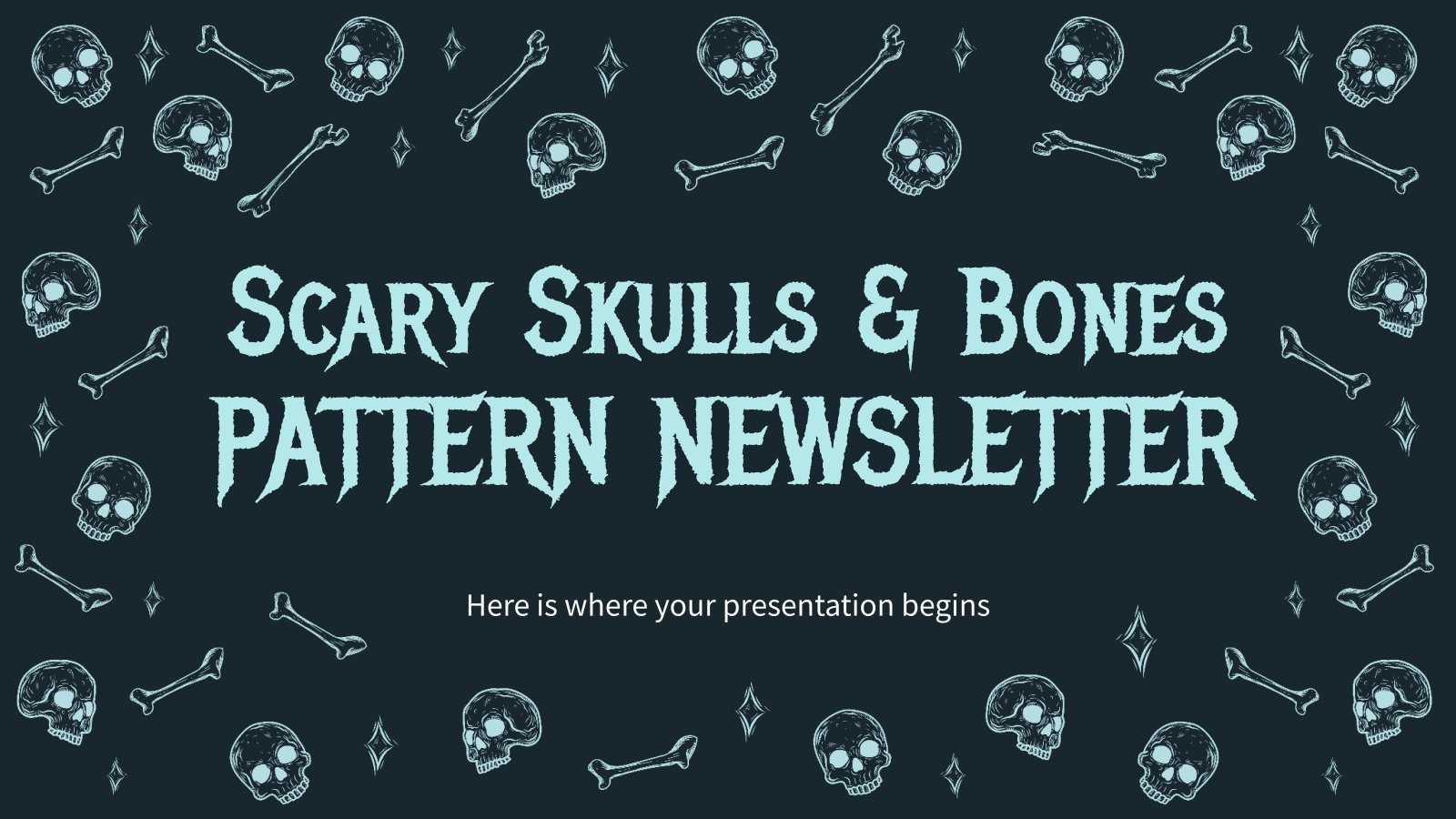
frankenstein
22 templates
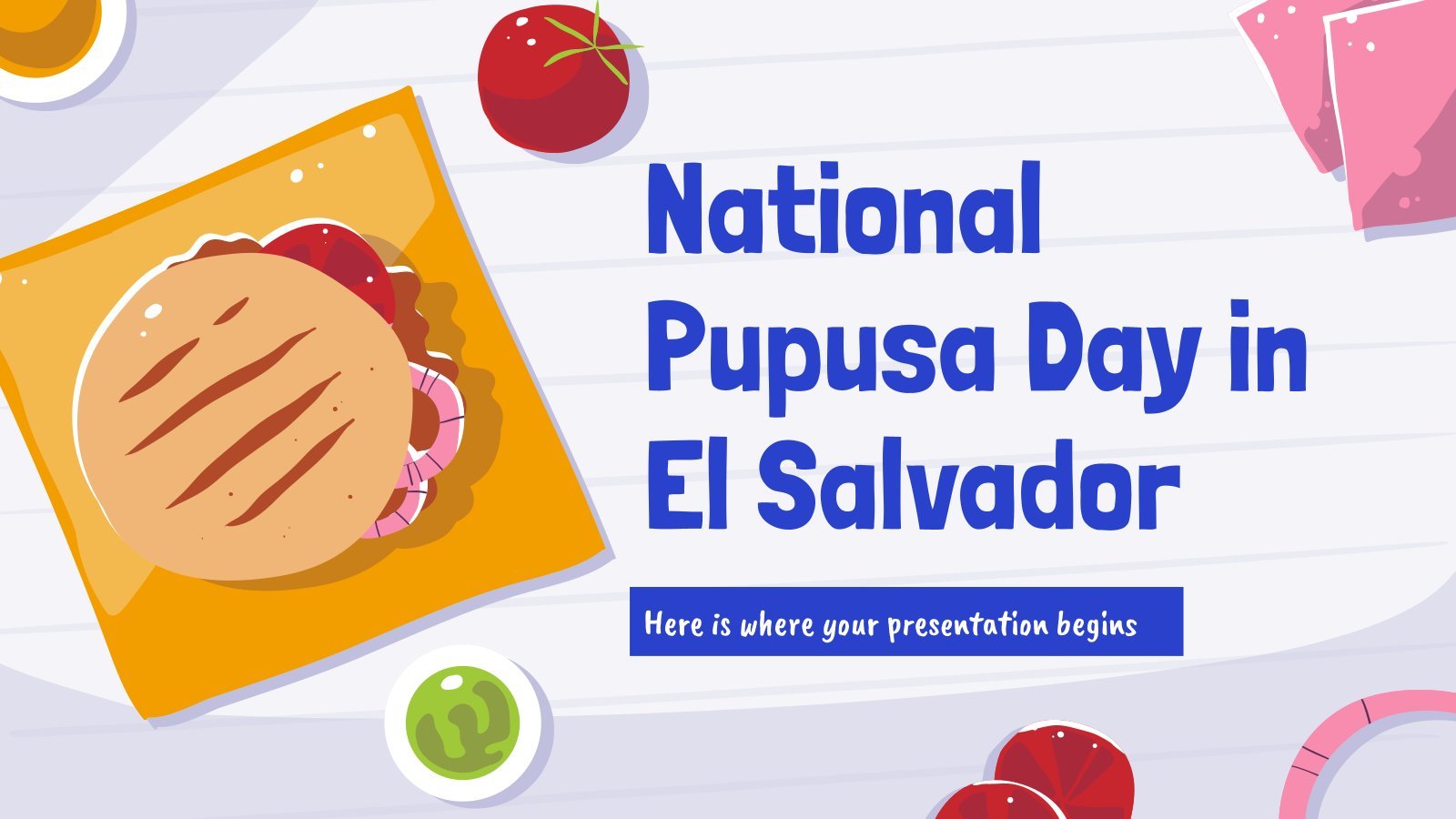
el salvador
32 templates
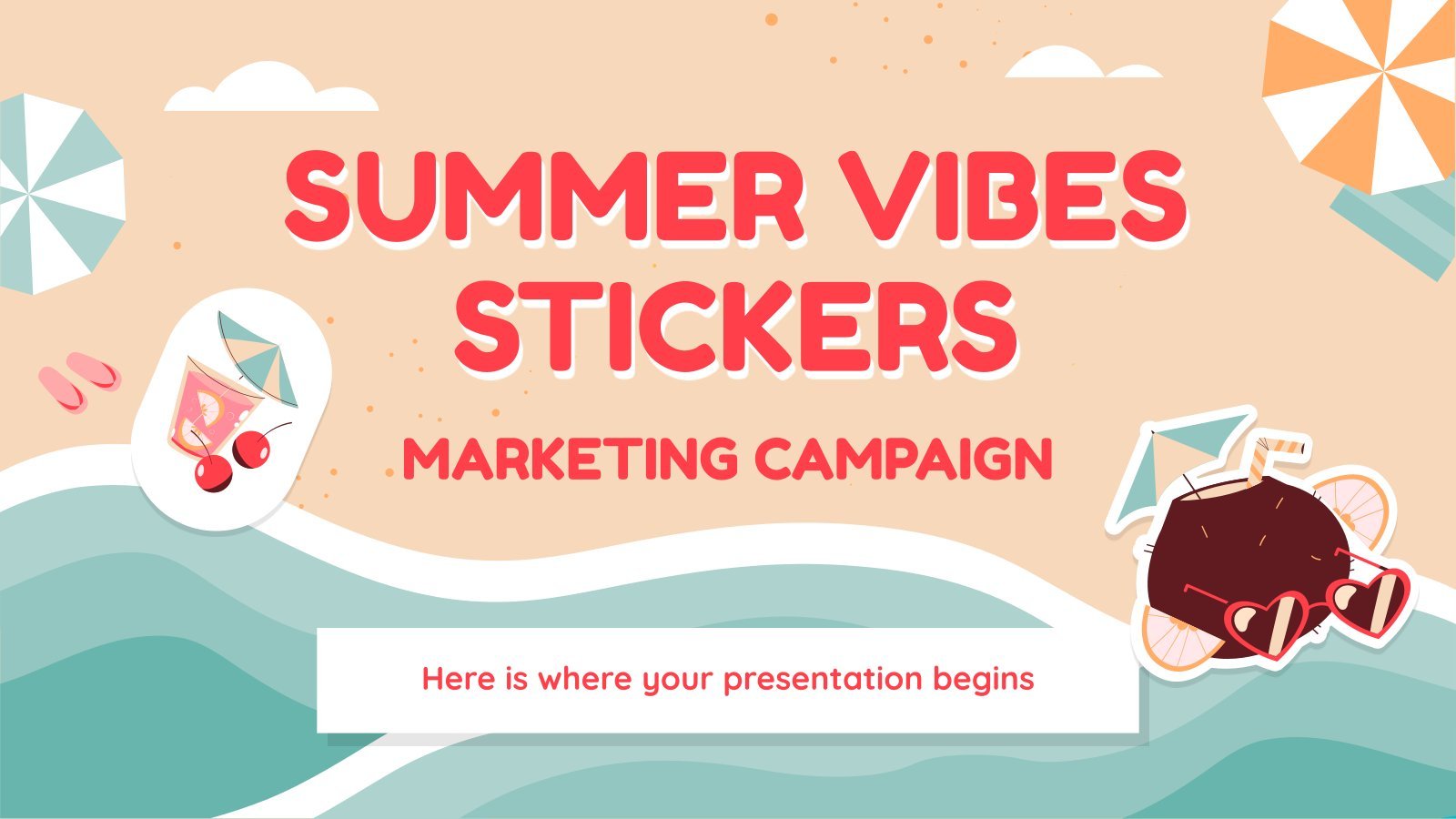
summer vacation
19 templates

44 templates

17 templates

pediatrician
27 templates
Historical Events and Narratives - German - Foreign Language - 9th Grade
Historical events and narratives - german - foreign language - 9th grade presentation, free google slides theme and powerpoint template.
Present Germany's unique and eventful history with this fully editable Google Slides and PowerPoint template. This resource illuminates the spectrum of Germany's past with striking illustrations set against a yellow backdrop. It comes fully-equipped with timelines, maps, and various graphical elements, perfect for preparing students for an in-depth study of Germany's history. Bring engaging lessons to your students while highlighting the importance of studying Germany's history. Crafted with education in mind!
Features of this template
- 100% editable and easy to modify
- Different slides to impress your audience
- Contains easy-to-edit graphics such as graphs, maps, tables, timelines and mockups
- Includes 500+ icons and Flaticon’s extension for customizing your slides
- Designed to be used in Google Slides and Microsoft PowerPoint
- Includes information about fonts, colors, and credits of the resources used
How can I use the template?
Am I free to use the templates?
How to attribute?
Attribution required If you are a free user, you must attribute Slidesgo by keeping the slide where the credits appear. How to attribute?
Related posts on our blog.

How to Add, Duplicate, Move, Delete or Hide Slides in Google Slides

How to Change Layouts in PowerPoint

How to Change the Slide Size in Google Slides
Related presentations.

Premium template
Unlock this template and gain unlimited access


IMAGES
VIDEO
COMMENTS
Download to read offline. 1. Welcome to your introductory course on German language! Ever so often it is being said that German is a hard German language to learn and that German society is ruled by strict norms and sometimes somewhat unusual values. Yet, every year, many people strive to learn our language for very different reasons.
Historical Perspectives and Events - German - Foreign Language - 10th Grade. This fully editable template, designed for both Google Slides and PowerPoint, is ideal for presenting German history in a clear and engaging manner. Made with precise AI illustrations in a sleek gray,on a cream background, every aspect of Germany's storied past can ...
Download the "Health and Wellness in Diverse Communities - German - 11th Grade" presentation for PowerPoint or Google Slides. High school students are approaching adulthood, and therefore, this template's design reflects the mature nature of their education. Customize the well-defined sections, integrate multimedia and interactive elements ...
Free Google Slides theme and PowerPoint template. Immerse yourself in the rich tapestry of the German language with this template for a high school lesson. The design of these slides look very German with all the flag backgrounds and other elements with the German colors. Create an engaging and enriching experience for high school students and ...
How to introduce yourself. The most important "little" words — I, you, he, she, they, it. How to talk about people using the verb "to be". Meet Jens. He will be your German tour guide during this brief exploration of the German language. He'll help you navigate the basics of German grammar and vocabulary. Play.
thank you for the vocabulary list. favorite word is Beamer. robert. Top. Learn German vocabulary you can use for preparing a presentation. In this FREE GermanPod101.com lesson, you learn the words and get translations and audio lessons.
German for basic users. Everything for basic users with no previous knowledge and for learners at levels A1 and A2 of Common European Framework of Reference for Languages (CEFR). Using videos, audios and interactive tasks, our free German courses teach you basic skills for everyday situations and simple conversations -in a comprehensive course ...
The Home of Primary School German. Welcome to a free, exciting and innovative method of delivering German lessons to school children. Zeit für Deutsch is a fast paced, upbeat German session performed by all members of the class in the target language. All topics are introduced by a song or chant and then activities relating to the topic follow.
Embarking on a journey to learn the German language opens up a world of opportunities, from exploring German culture to enhancing career prospects. However, for beginners, navigating the various levels of German proficiency can be daunting. ... An Image/Link below is provided (as is) to download presentation Download Policy: ...
Sehr geehrte Damen und Herren, mein Name ist... Ladies and Gentlemen, my name is. Ich komme aus. I come from. Liebe Kolleginnen und Kollegen. Ladies and gentlemen (dear colleagues) In meiner Präsentation geht es um. my presentation is about/ concerns. In meiner Präsentation werde ich ihnen... vorstellen.
Premium Google Slides theme and PowerPoint template. Make learning the language of Goethe easier and more enjoyable with this creative template. This simple, cream-colored template helps you to organize and structure your language learning journey with a unique and creative approach. Not only does it provide you with the basic German grammar ...
Our German Discussion Topics offers a diverse range of subjects tailored for learners at various proficiency levels. By participating in discussions on these topics, you will not only improve your language abilities but also gain valuable insights into German culture. We have carefully curated topics from various categories, including politics ...
Looking for German Lessons with German Language Basics, introduction to the German Language Classes with the German Language Learning App. 50 views • 4 slides Bitcoin presentation (German language)
The best moment is at the end of your presentation. And everything between the initial question and the answer must be a story that leads from one step to the next. Never forget that your presentation is only good if you tell a fascinating and pulsating story. It begins with an interesting question and ends in an surprising answer.
Mein Name ist Lucy Stein. - My name is Lucy Stein. First two options are less formal. "Mein Name ist …" is more often used when you say your full name. 2. Country and nationality in German. Ich komme aus _______ . - I am from (country). Examples:
The basics of the German language. Greetings, saying goodbye and basic phrases to start speaking German. 1 Saying hello. 2 Saying our name. 3 Asking what another person's name is. 4 Saying what our profession is. 5 Asking what another person's profession is. 6 Saying Your Age. 7 Asking how old someone is.
Free Google Slides theme and PowerPoint template. Prepare new clients for one of the most spoken languages in the world: German! This fun template full of color and stickers will be their "willkommen" into a new learning center that will change how they have learned languages until now. Edit the slides and add the information about your ...
The German language is actually a really popular spoken language (it's #11 in the world!). Germany, Austria, and Switzerland are all German-speaking countries. Learning how to introduce yourself in German will help you if you visit or move to one of those countries. We know learning a foreign language is a challenge, even the basics.
Skills required to achieve mastery of public speaking and power presentations with the help of role-playing. By the end of the German Public Speaking course you will be able to: structure the presentation and link the various parts. use key language and a variety of rhetorical techniques. prepare and incorporate visual aids.
Below you will find a list of business German phrases that may come in handy during a presentation. Learning through phrases, rather than vocabulary lists, helps you learn in context, which is crucial to achieve full fluency. 🇬🇧 The presentation will take about 30 minutes. 🇩🇪 Die Präsentation wird etwa 30 Minuten dauern.
With this modern template you can prepare a fun, creative lesson that will make your students fall in love with German. Der, Die and Das will be no secret for your students after you download and edit this presentation for your foreign language lessons!
Free Google Slides theme and PowerPoint template. Present Germany's unique and eventful history with this fully editable Google Slides and PowerPoint template. This resource illuminates the spectrum of Germany's past with striking illustrations set against a yellow backdrop. It comes fully-equipped with timelines, maps, and various graphical ...